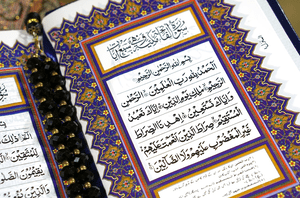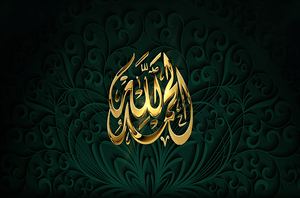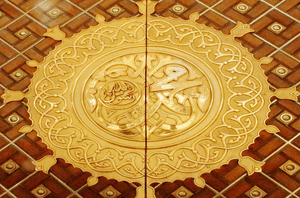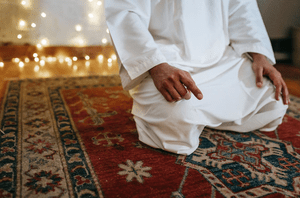Once you have completed your recitation, go down into rukūʿ, saying ‘Allāhu Akbar’ (Allah is Greater than…!). Reflect on the meaning of this great phrase when you say it.
Lower your head in awe of the Lord of the worlds. Straighten your back, let every joint in your body relax, and glorify Him by uttering:
x3 سُبْحَانَ رَبِّـيَ الْعَظِيْمِ
How perfect is my Lord, the Magnificent!
The Messenger of Allah ﷺ said, “As for the rukūʿ, then magnify the Lord in it” (Muslim).
Rukūʿ is one of the most significant pillars of ṣalāh. Its position is one of the most intense symbols of servitude, submission and humility. In rukūʿ, not only do you glorify Allah (ʿazza wa jall) but you also simultaneously humble: the heart, the tongue and the limbs. Feel your self-importance diminishing, whilst the awe and glory of Allah (ʿazza wa jall) expand in your heart. The more your heart glorifies Allah (ʿazza wa jall), the fear and awe of His creation will slowly vanish from your heart.
Everything other than Allah (ʿazza wa jall) will begin to appear small and insignificant.
Do not rush this position. Take your time, prolong your rukūʿ whenever possible and inshā’Allah you will feel the sweetness and joy in this position.
The secret of rukūʿ
The adhkār (remembrances) of rukūʿ are the secret of this pillar. Make every effort to memorise them. They will help you in internalising the greatness and grandeur of Allah (ʿazza wa jall). The Prophet ﷺ would lengthen his rukūʿ to the same duration as his qiyām in his voluntary prayers, repeating the following adhkār with humility, devotion and reflection:
1. سُبْحَانَ رَبِّـيَ الْعَظِيْمِ
How perfect is my Lord, the Magnificent!
In stating the word ‘subḥān’, you are declaring the perfection of Allah and negating all deficiencies. This is followed by the word ‘rabbī’ (my Lord). Note the use of the pronoun ‘my’. Saying ‘my’ should stir a sense of closeness, bonding and love. Allah (ʿazza wa jall) is my Lord, the One who created me, nurtures me, feeds me, clothes me, heals me and manages all of my affairs. Next, you describe Him (ʿazza wa jall) as ‘al-ʿAẓīm’: the Magnificent, the Great.
سُبْحَانَ اللّٰهِ means to glorify Allah (ʿazza wa jall) above any imperfection or deficiency i.e Allah (ʿazza wa jall) is free from all defects. Allah (ʿazza wa jall) is the Most Glorified who has no partner or rival, who possesses every aspect of perfection, and whose actions are pure and free from evil.
2. سُبْحَانَ ذِي الْجَبَرُوْتِ والْمَلَكُوْتِ والْكِبْرِيَاءِ والْعَظَمَةِ
How perfect is the Owner of might, dominion, grandeur and greatness! (Abu Dawūd).
الْجَبَرُوْتِ [might]: the origin of this word is jabr. This refers to:
a) The power and might of Allah (ʿazza wa jall), through which He compels His creation according to His will, and through which He will seize the worldly jabābirah (tyrants).
b) Allah (ʿazza wa jall) mending and restoring the condition of those who are ‘broken’, weak and oppressed.
c) The sublimeness of Allah (ʿazza wa jall) which cannot be comprehended by the limited human mind.
الْمَلَكُوْتِ [dominion]: Allah (ʿazza wa jall) is the King, whose dominion is everything that surrounds us; that which we can see and cannot see. Of the latter are the Kursī, the Throne of Allah, Paradise and the Hell-fire.
الْكِبْرِيَاءِ [grandeur]: This quality is only praiseworthy for Allah (ʿazza wa jall), and is not one that human beings should have. Only He is entirely Perfect in every sense.
الْعَظَمَةِ [greatness]: There is nothing greater, more vast and more powerful than Allah. Our limited minds cannot perceive His greatness.
3. اَللّٰهُمَّ لَكَ رَكَعْتُ ، وَبِكَ اٰمَنْتُ ، وَلَكَ أَسْلَمْتُ ، خَشَعَ لَكَ سَمْعِيْ ، وَبَصَرِيْ ، وَمُخِّيْ ، وَعَظْمِيْ ، وَعَصَبِيْ
O Allah, for You Alone I have bowed in prayer, in You Alone I have believed, and to You Alone I have submitted. My hearing, sight, mind, bones and nerves are humble to You (Muslim).
In this duʿā’, you are affirming your devotion and submission to Allah (ʿazza wa jall), the Almighty.
سَمْعِيْ [My hearing]: My hearing has humbled to You, thereby, ensuring I will not listen to anything that displeases you. I will not listen to evil speech, backbiting or music.
بَصَرِيْ [My sight]: My sight has humbled to You. I will, therefore, not look at anything unlawful.
These two senses have been singled out in this duʿā’ because they are responsible for most of our distractions. The humbling of both these senses and ensuring they submit to Allah (ʿazza wa jall) will result in an automatic decrease in the whispers of Shayṭān. The impact of this will then appear on the rest of the body.
Reflect
Ask yourself: Have I really submitted?
Am I watching ḥarām content? Am I engaging in ribā? Am I being good to my neighbours? Am I observing ḥijāb as per the commands of Allah , or am I being swayed by society’s false interpretation of it?
4. سُبُّوْحٌ، قُدُّوْسٌ، رَبُّ الْمَلَائِكَةِ وَالرُّوْحِ
The Supremely Perfect, The Most Pure, The Lord of the Angels and the Spirit [Jibrīl] (Muslim).
قُدُّوْسٌ [The Most Pure]: Allah (ʿazza wa jall) is Pure from all defects and evil. He is Pure in His (ʿazza wa jall) Essence and in all of His actions. He is Free from what our imaginations perceive about Him; He transcends what we think of as ‘perfection’. He is Free from oppression, partner or child. There is no one like Him. He b purifies the hearts of His believing slaves, and is glorified by them and the angels.
5. سُبْحَانَكَ اللّٰهُمَّ رَبَّنَا وَبِحَمْدِكَ، اَللّٰهُمَّ اغْفِرْ لِيْ
How perfect are You, O Allah, our Lord, and all praise is for You. O Allah, forgive me (Muslim).
This duʿā’ affirms the positive attributes of Allah (ʿazza wa jall), and negates all negative attributes. The praise also precedes the request for forgiveness, making it likelier to be accepted.
The Prophet ﷺ would supplicate regularly with this duʿā’. ʿĀ’ishah (raḍiy Allāhu ʿanhā) reported, “I did not see the Messenger of Allah ﷺ performing any prayer since (Sūrah al-Naṣr) was revealed, except that he supplicated or said in it [the above supplication]” (Muslim).
This is because Sūrah al-Naṣr contains the direct commandment of Allah (ʿazza wa jall) to His beloved ﷺ: “Then extol the perfection and praise of your Lord, and seek forgiveness from Him. Surely He is Ever Relenting” (110:3).
The above command was revealed to him at the end of his life to prepare him to meet his Lord. Thus, he ﷺ was instructed to occupy himself in glorifying, praising and seeking forgiveness from Him.
6. سُبْحَانَكَ وَبِحَمْدِكَ لَا إِلٰهَ إِلَّا أَنْتَ
How Perfect are You, and all praise is for You. There is no god worthy of worship except You (Muslim).
When the night would approach, Uways al-Qarnī (raḥimahullāh) would say, “This night is for bowing”, and he would bow until the morning. Sometimes he would say, “This night is for prostrating”, and he would prostrate until the morning.
Reflect
Ask yourself, how is my submission to Allah (ʿazza wa jall)? Do I submit to Him (ʿazza wa jall) equally both in private and in public? Is my submission to Allah (ʿazza wa jall) the same when I am serious and when I am joking around? Do I take jokes too far by lying, just to make others laugh? Do I submit in times of anger like I do when I am calm? Or do I dispose of the beautiful conduct which my faith in Allah (ʿazza wa jall) requires from me, and hurt those around me?
Reflect
A temporary submission
Do I submit to Allah inwardly and outwardly in Ramaḍān, but then forget Him (ʿazza wa jall) throughout the rest of the year?
Do I return to Allah (ʿazza wa jall) and beg His (ʿazza wa jall) forgiveness when I become ill or am undergoing difficulty, and then forget about Him (ʿazza wa jall) once my health has improved or the difficulty has passed?
Do I cry and does my heart soften when a loved one passes away, but quickly become distracted again by the glamour and glitz of this life?
Do I wear ḥijāb when I visit the house of Allah, but then remove it after leaving?






